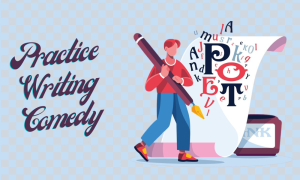
Writing
Introduction
Everyone says, “Be funny.” But they don’t tell you how. So here’s a practical guide for becoming a comedy writer, whether you want to be on a Comedy Central roast, write for SNL, or simply write hilarious tweets daily.
Step 1: Understand Different Comedy Styles

The first step in becoming a comedy writer is to understand the different types of comedy. For more insight, explore the 8 Tips for Writing Short Film which can help you grasp different narrative styles, including humor. Humor is subjective, so there are many ways to approach it. You can be silly or serious, sarcastic or sincere. You can use puns or metaphors, sight gags or slapstick.
Comedy writers have their style, just like authors and artists do. Some will tell jokes, while others rely on situational humor. Some use humor to mask deeper social commentary, while others make fun of what’s happening around them.
The best way to learn how to write comedy is to read as much as possible and see how other writers do it, then try your hand at it yourself.
Step 2: Study Successful Comedy Writers

Study successful comedy writers, and learn how they do it. You can also gain inspiration from the 15 Best Horror Authors You Must Read, as horror and comedy often share the same timing and subversion of expectations. The best way to do this is to read their work and then watch them perform it in front of an audience. If you can’t get tickets to see your favorite comic life, buy a DVD or watch them on YouTube (or both).
While watching a comedy show, pay attention to what makes the comedian funny. What are they doing that works? How are they using their body language? What is the tone of their voice? What words do they use? How does the audience respond?
When you read someone’s writing, remember how they convey their message. The most effective writing will have a clear message and be easy to digest in one sitting. You should also notice how the writer uses words to paint a picture for the reader or add humor or emotion.
Don’t just focus on what makes writing funny — look at everything happening with each sentence and paragraph. Ask yourself: “Why did they choose this word over another?” “What did this sentence accomplish?” And “How could I improve this sentence?”
Step 3: Develop Your Sense of Humor

The funniest people I know are not necessarily the most skilled comedians. They are just good at making people laugh. And they do that by being themselves. So the first thing you need to figure out is what makes you laugh.
Some people like jokes, some don’t. Some people like silly slapstick comedy, while others prefer witty dialogue. You can’t please everyone, but you should at least know what comedy genre you prefer before writing anything.
If you’re still unsure about this, check out some standup comedians on YouTube and see if they speak to your soul. Try listening to one of their sets from beginning to end without laughing at least once or twice (if possible). This will give you an idea of whether or not you’re capable of developing a sense of humor that others might also appreciate.
If you watch standup comedy videos every night for hours and laugh hysterically at everything they say, congratulations! You have a natural talent for comedy writing! If not, don’t worry… there’s still hope for you!
Step 4: Practice Writing Comedy

Comedy is an art form. It cannot be learned from a classic book writing or in a classroom. You must practice writing comedy and seeing what works and what doesn’t. Consider reading about How to Become a Novelist for tips on crafting compelling narratives, which is a crucial skill for a comedy writer too.
There are several different ways to do this, but here are some of my favorites:
Write a blog about something you’re passionate about (or even something you hate). You can write about whatever you want and try different humor for your audience.
Join an online forum or community where people discuss current events and issues. You don’t have to be funny in these places; just keep your eyes open for opportunities to make jokes that fit into the conversation.
Read books by comedians who inspire you. Check out Best Autobiographies of All Time for memoirs of some of the greatest humorists., like Louis C.K., Dave Chappelle and Amy Schumer. Read their books cover-to-cover, if possible, to see how they structure their jokes and build stories around them.
Watch standup specials by comedians who inspire you, and for a deeper understanding of the craft, dive into How to Write a Movie Script, such as Jim Gaffigan’s Mr. Universe on Netflix or Louis C.K.’s Live at Beacon Theater on HBO Go/Now (for free!).
Find a job by searching comedy writers for hire on the internet to get the best job. You might also want to check out How to Build a Portfolio for Freelancers to showcase your comedy writing effectively. It will help you practice comedy writing.
Step 5: Seek Feedback and Refine Your Skills

The best way to improve your comedy writing skills is by getting feedback from others. You must find an audience who will be honest with you in their feedback, and engaging with a community can be beneficial. Learn how to connect with one through Pinterest for Bloggers. but it’s also important not to take everything they say to heart. You’ll need to find a balance between constructive criticism and positive reinforcement.
If you’re serious about becoming a comedy writer, seeking opportunities to receive feedback on your work is important. You can join a comedy writing group or find an online community of writers willing to give constructive criticism.
Once you have some feedback, start refining your skills based on what people have told you. Make sure that the humor in your writing comes from character traits and situations rather than random one-liners or puns that don’t add anything to the story itself.
Do I need to be a performer to be a comedy writer?
No, being a performer is not a requirement for comedy writing. While some comedy writers are also performers, many successful comedy writers focus solely on writing. If you’re looking to hone just your writing, consider the specialized guidance of Comedy Writing Services. and collaborate with performers to bring their jokes to life.
How can I find my comedic voice?
Finding your comedic voice takes time and experimentation. Explore different styles, write regularly, and notice what makes you laugh. Your comedic voice will emerge as you develop your unique perspective and style of humor. For further development of your voice, Content Development Services can offer personalized assistance.
Is it necessary to take comedy writing classes or workshops?
While formal education or workshops can be helpful for book editing, however, they are not a requirement for becoming a comedy writer. Numerous resources are available online, such as books, tutorials, and writing communities, where you can learn and improve your comedy writing skills.
Essential Elements and Detailed Insights
| Step | Core Idea | Actionable Advice |
|---|---|---|
| Understand Comedy Styles | Grasping various comedy forms and finding your style. | Explore different narrative styles and understand your humor preference, be it puns, slapstick, or situational comedy. |
| Study Successful Writers | Learning from established comedy writers. | Read works of famous comedians, watch their performances, and analyze their techniques and timing. |
| Develop Humor Sense | Cultivating your unique sense of humor. | Identify what makes you laugh. Watch stand-up shows to understand your humor taste and practice creating jokes in that style. |
| Practice Writing Comedy | Regular writing to hone comedic skills. | Write blogs, join online forums, read books by comedians, and watch standup specials. Try different humor styles in your writing. |
| Seek Feedback & Refine | Improving through critique and practice. | Join writing groups or online communities for feedback, and refine your skills based on constructive criticism. |
| Finding Your Voice | Establishing a unique comedic perspective. | Experiment with different styles and write regularly to discover and develop your comedic voice. |
| Education in Comedy Writing | Learning the craft formally or informally. | While classes can help, they are not mandatory. Utilize online resources, books, and tutorials to learn and improve. |
Conclusion
Becoming a comedy writer is an exciting and rewarding journey. These five actionable steps can enhance your comedic writing skills and pave the way for a successful career. Remember to explore different comedy styles, study successful comedy writers, develop your sense of humor, practice writing comedy regularly, and seek feedback to refine your skills. With dedication, perseverance, and a touch of humor, you can unleash your comedic talent and captivate audiences with your wit.









Leave a Reply